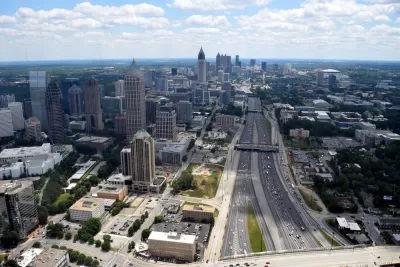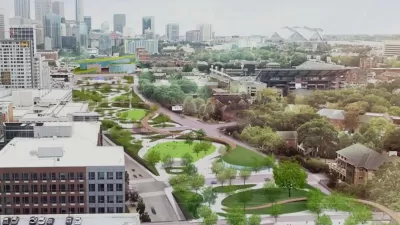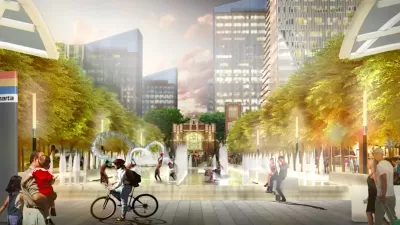The city council voted to apply for a $1 million federal grant to study the potential benefits of building a park over downtown freeways.

An Atlanta highway cap could finally become a reality, writes John Green. "Recent actions by the Atlanta City Council and Georgia legislators could lend hope for greenspace advocates that downtown’s grandiose, highway-capping 'Stitch' proposal still has a pulse."
Despite popular support, "[i]n more recent years, Stitch studies, panelist conferences, and calls among stakeholders for launching fundraising and engineering efforts haven’t translated to a shovel’s worth of dirt being turned. But with a transportation infrastructure push afoot in Washington, D.C., the Stitch concept is showing signs of renewed interest—and possible viability." To move the project forward, "the Atlanta City Council voted to move forward in applying for a $1 million federal grant that would help fund a study for implementing the Stitch, which advocates say would effectively weave interstate-bisected parts of downtown back together." However, "that federal cash boost would be a far cry from the Stitch’s estimated cost of $300 million or more, per ADID’s ongoing analyses. "
"But ADID officials are optimistic for what the Stitch could mean for downtown: between $1.1 and $3.1 billion in value creation; up to $58 million in new revenue; and a boost in the city’s bonding capacity from $308 to $847 billion 'by increasing the value of existing properties and catalyzing the redevelopment of underutilized properties,' per the most recent summary." The city is weighing creating a 25-acre park that would cap the I-75 and I-85 freeways and "reconnect neighborhoods torn apart by the interstate."
FULL STORY: Downtown's highway-capping 'Stitch' project shows signs of life

Planetizen Federal Action Tracker
A weekly monitor of how Trump’s orders and actions are impacting planners and planning in America.

Congressman Proposes Bill to Rename DC Metro “Trump Train”
The Make Autorail Great Again Act would withhold federal funding to the system until the Washington Metropolitan Area Transit Authority (WMATA), rebrands as the Washington Metropolitan Authority for Greater Access (WMAGA).

The Simple Legislative Tool Transforming Vacant Downtowns
In California, Michigan and Georgia, an easy win is bringing dollars — and delight — back to city centers.

Demise of Entertainment Industry Mirrors Demise of Housing in LA
Making movies has a lot in common with developing real estate: producers = developers; screenwriters = architects; directors = general contractors. The similarities are more than trivial. Both industries are now hurting in L.A.

How Public Spaces Exclude Teen Girls
Adolescent girls face unique challenges and concerns when navigating public spaces. We can design cities with their needs in mind.

Proposed Ohio Budget Preserves Housing Trust Fund
The Senate-approved budget also creates two new programs aimed at encouraging housing construction.
Urban Design for Planners 1: Software Tools
This six-course series explores essential urban design concepts using open source software and equips planners with the tools they need to participate fully in the urban design process.
Planning for Universal Design
Learn the tools for implementing Universal Design in planning regulations.
Smith Gee Studio
City of Charlotte
City of Camden Redevelopment Agency
City of Astoria
Transportation Research & Education Center (TREC) at Portland State University
US High Speed Rail Association
City of Camden Redevelopment Agency
Municipality of Princeton (NJ)





























